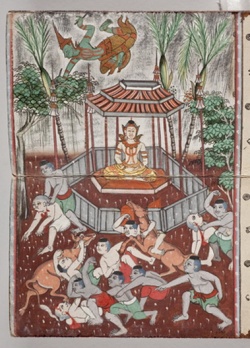Difference between revisions of "Dhātukathā"
Jump to navigation
Jump to search
| Line 1: | Line 1: | ||
[[File:939a.jpg|thumb|250px|]] | [[File:939a.jpg|thumb|250px|]] | ||
| − | Dhātukathā: One of the seven [[Books]] of [[The Abhidhamma Pitaka]]. It seems to have been designed as a supplement to the [[Dhammasangani]], and discusses, chiefly, the | + | '''Dhātukathā''': One of the seven [[Books]] of [[The Abhidhamma Pitaka]]. It seems to have been designed as a supplement to the [[Dhammasangani]], and discusses, chiefly, the [[Mental]] characteristics found in converted and earnest persons. It is divided into fourteen sections and possesses a Commentary by [[Buddhaghosa]]. Published by the P.T.S. |
The Sarvāstvādins call the Dhātukathā the Dhātukāyapada. There seems to have existed in Ceylon another work called the Mahādhātukathā, claimed by the Vitandavādins as an [[ABHIDHAMMA]]-work, but rejected by the orthodox as uncanonical. DhSA.4. | The Sarvāstvādins call the Dhātukathā the Dhātukāyapada. There seems to have existed in Ceylon another work called the Mahādhātukathā, claimed by the Vitandavādins as an [[ABHIDHAMMA]]-work, but rejected by the orthodox as uncanonical. DhSA.4. | ||
Revision as of 17:02, 8 April 2013
Dhātukathā: One of the seven Books of The Abhidhamma Pitaka. It seems to have been designed as a supplement to the Dhammasangani, and discusses, chiefly, the Mental characteristics found in converted and earnest persons. It is divided into fourteen sections and possesses a Commentary by Buddhaghosa. Published by the P.T.S.
The Sarvāstvādins call the Dhātukathā the Dhātukāyapada. There seems to have existed in Ceylon another work called the Mahādhātukathā, claimed by the Vitandavādins as an ABHIDHAMMA-work, but rejected by the orthodox as uncanonical. DhSA.4.
